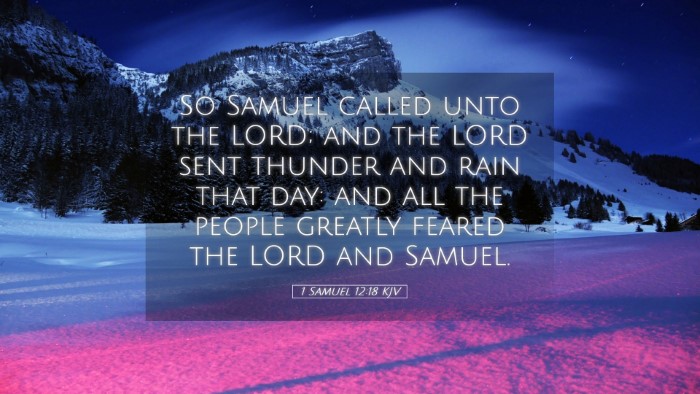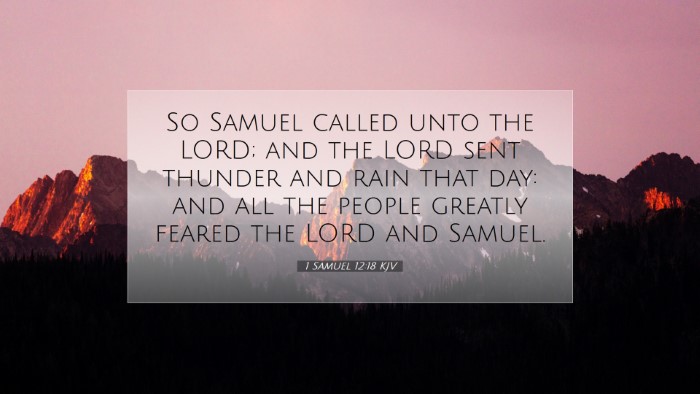Commentary on 1 Samuel 12:18
Bible Verse: 1 Samuel 12:18 - "So Samuel called unto the LORD; and the LORD sent thunder and rain that day: and all the people greatly feared the LORD and Samuel."
Introduction
This significant verse occurs in the context of Samuel’s farewell address to the Israelites, where he recounts God’s faithfulness and the people's demands for a king. The miraculous signs of thunder and rain serve as divine confirmation of Samuel’s message and enhance the gravity of their situation. The importance of this event lies not only in what it reveals about God’s power but also in how it underscores the necessity of reverence towards Him and His prophets.
Exegetical Insights
Contextual Background
As one studies the historical setting of 1 Samuel, it becomes clear that the Israelites are at a pivotal moment. They have rejected God’s direct rule in favor of a human king. Samuel’s role as a prophet is crucial here; he intercedes on behalf of a wayward people. This passage emphasizes Samuel’s unique position as a mediator between God and His people.
The Invocation of God
Samuel calls upon the LORD, demonstrating his reliance on divine sovereignty. Commentators emphasize that this act is both a plea for intervention and an acknowledgment of God’s authority (Albert Barnes). The thunder and rain symbolize God’s power over nature and serve as a response to Samuel’s earnest invocation. The response of nature indicates that God is still in control of His creation, despite the people's preference for a king.
The Significance of Thunder and Rain
In the context of ancient Israel, thunder and rain were often interpreted as signs of God's presence and judgment. As Adam Clarke notes, this combination signifies both awe and the seriousness of the message being conveyed. The immediate effect of this display was the fear that it instilled in the people—not just fear of the storm but a deeper, reverential fear of the LORD Himself. This is crucial as it prompts them to reconsider their relationship with God and with Samuel.
Theological Implications
God's Sovereignty and Authority
This verse strongly reflects God's sovereignty. The elements obey His will, which cannot be overlooked by the Israelites. Matthew Henry highlights the importance of recognizing the majesty of God. The acknowledgment that God controls the weather serves as a potent reminder that despite their desire for a king, it is ultimately God who reigns supreme.
The Fear of the LORD
The fear displayed by the people symbolizes a shift in their understanding. Initially, they sought a king to lead them, potentially diminishing their reverence for God. However, Samuel's invocation and the subsequent miraculous signs led them to respect both the leader God had appointed and God Himself. As noted by various scholars, this incident serves as a call to genuine repentance (Albert Barnes), and the fear elicited here can lead to a renewed relationship characterized by obedience and submission to God's will.
Application for Today
Understanding Divine Communication
Today's believers are encouraged to heed the messages sent by God through His appointed leaders. The might of the thunder and rain serves as an illustration of how God can communicate His will. Pastors and theologians can draw parallels to contemporary signs, seeing how God still manifests His power today—be it through natural phenomena or through the workings of His Spirit in the lives of believers. Recognizing God's sovereignty allows for a deeper faith, much like that experienced by the Israelites in this narrative.
The Role of the Prophet
Samuel's role as a mediator reminds modern believers of the necessity of listening to God’s word as communicated by appointed leaders. Samuel’s prayer life and reliance on God should inspire both laypeople and clergy to cultivate a deeper prayer life in their ministry. The people’s response reflects a biblical principle: After witnessing the power of God, our understanding of leadership and authority must align with His divine will instead of mere human preference.
Reverence in Worship
The response of the people—great fear—illuminates a critical aspect of worship. True worship is marked by reverence for God. In contemporary worship settings, there is a call for a return to esteeming God's holiness. Just as the Israelites were reminded of God's authority and majesty, modern congregations are encouraged to approach worship with a heart that is reverent and grateful, recognizing their dependence on divine mercy and guidance.
Conclusion
The narrative surrounding 1 Samuel 12:18 provides layers of meaning for readers today. It urges introspection regarding the priorities of faith communities, suggesting a re-evaluation of whom they trust and follow. The miraculous sign of thunder and rain that followed Samuel's prayer serves as both a warning and an encouragement that demonstrates God's active presence in their lives. The realization that God is sovereign and worthy of reverence is as crucial now as it was then. Hence, pastors, theologians, and scholars must draw from this rich text to illuminate the paths of faith for their congregations.


